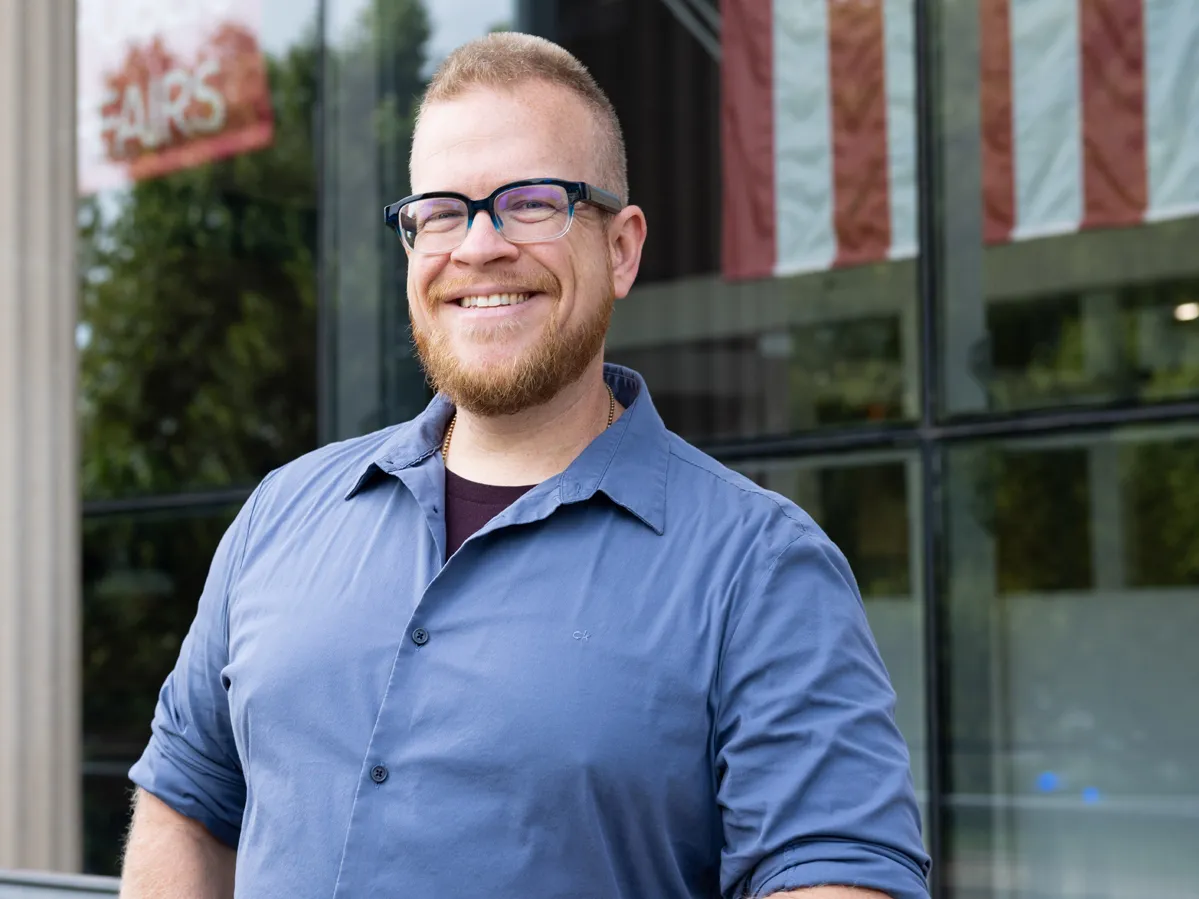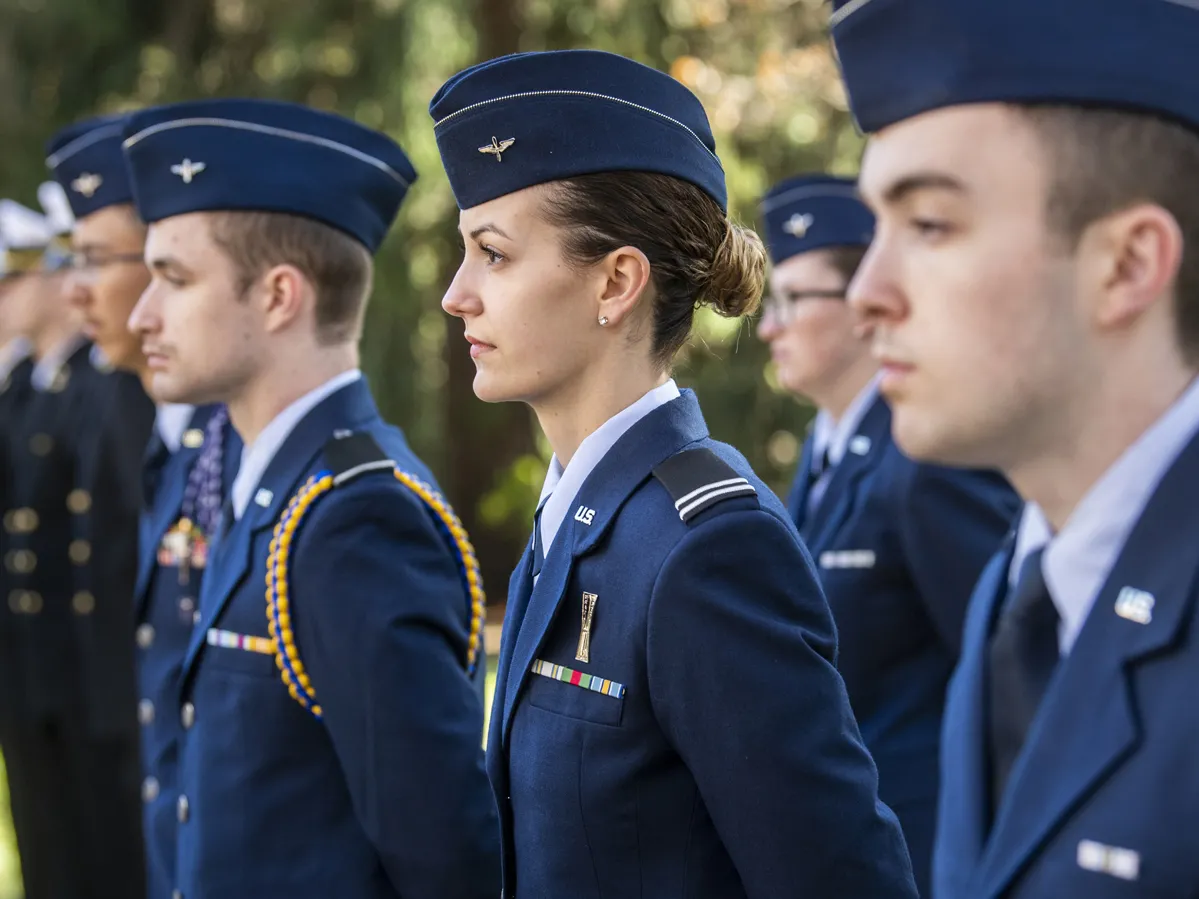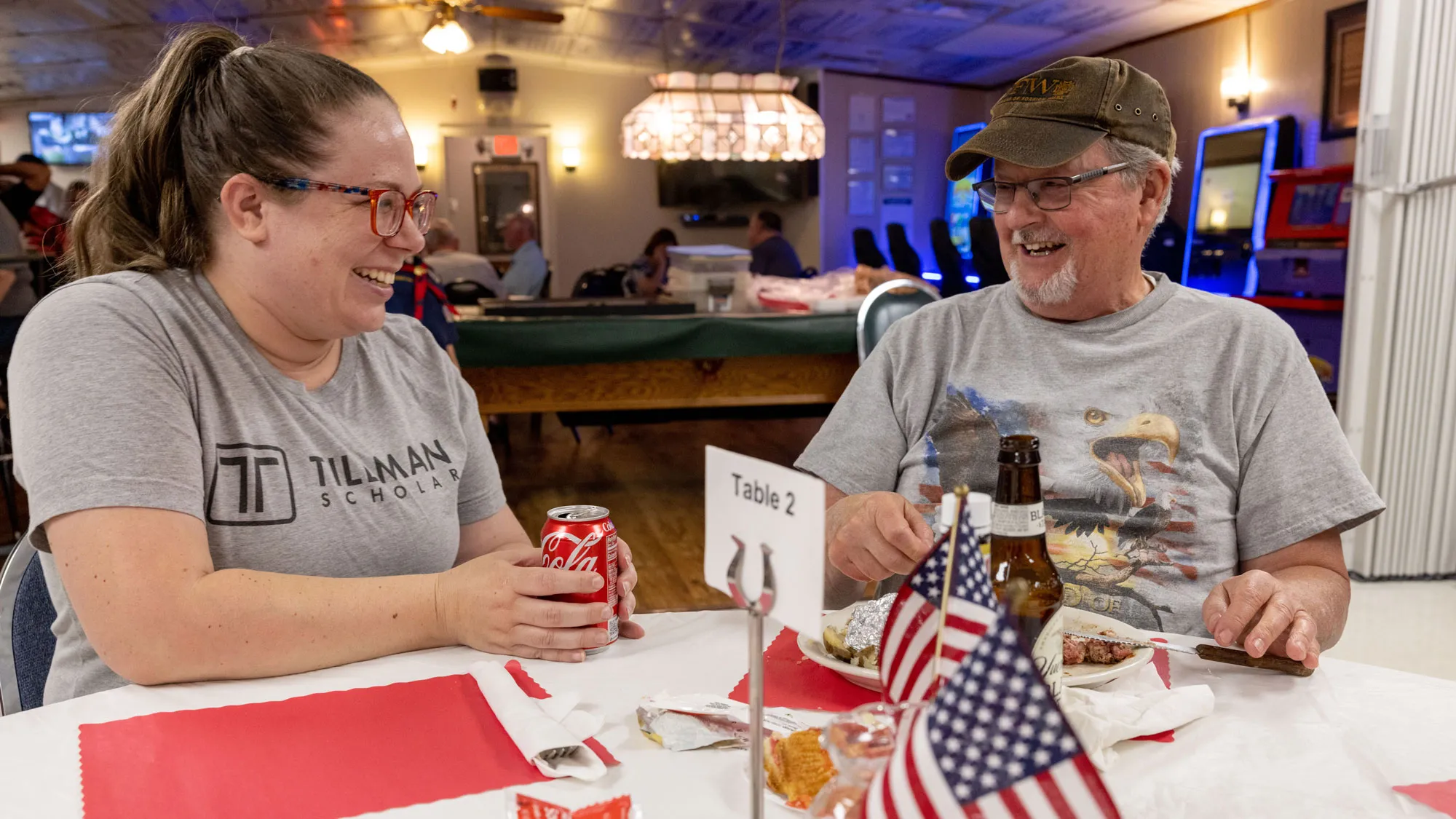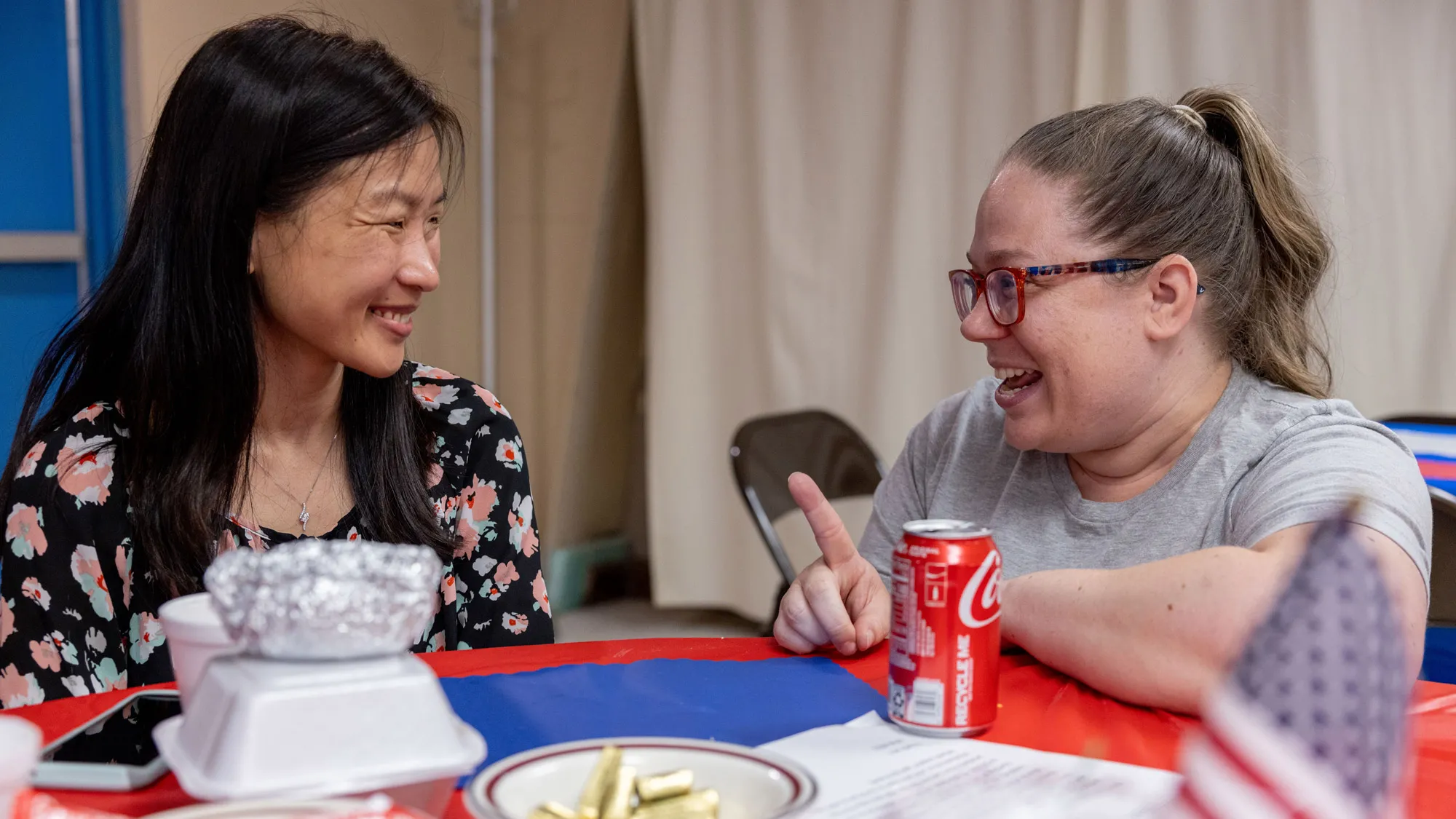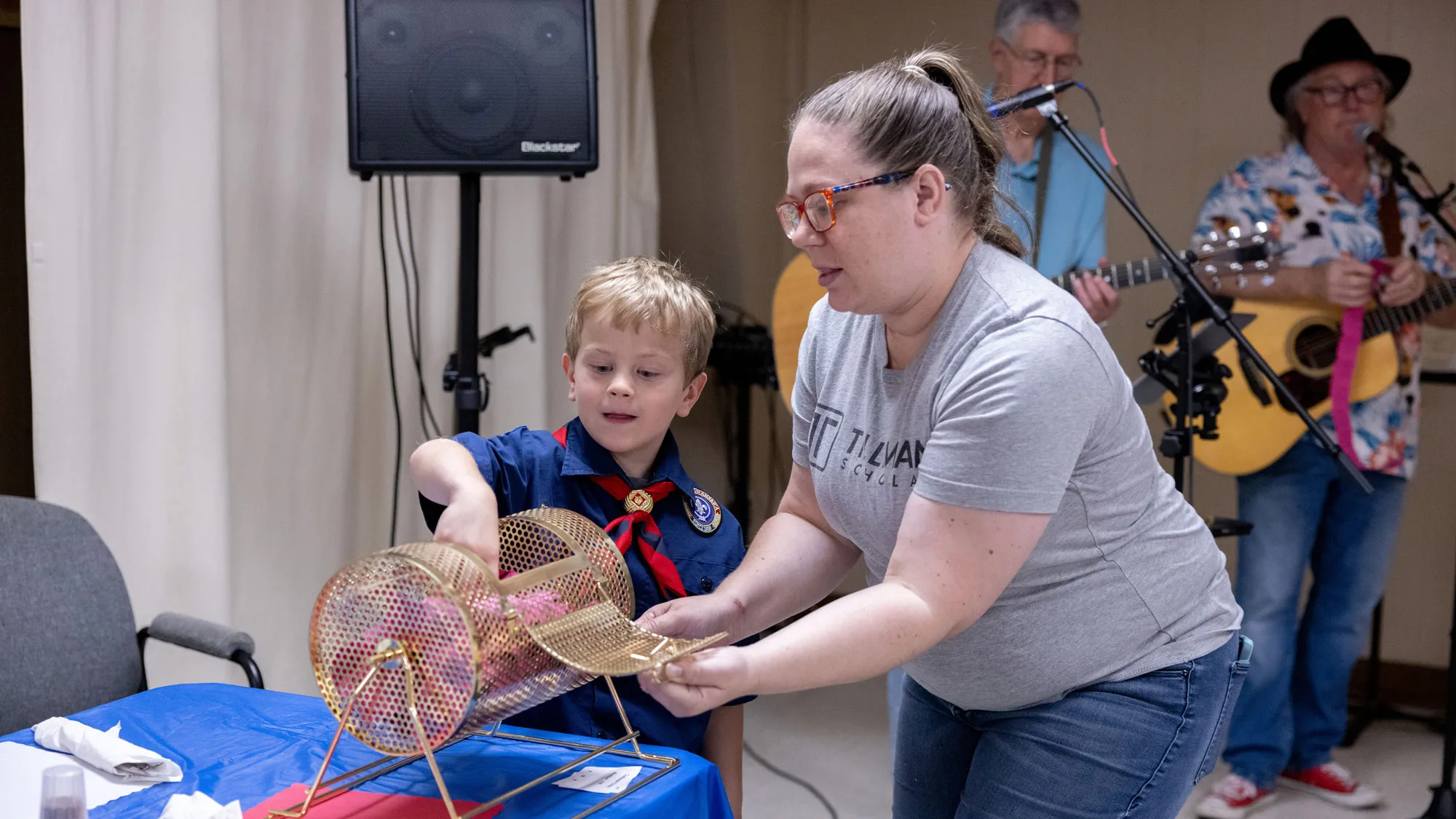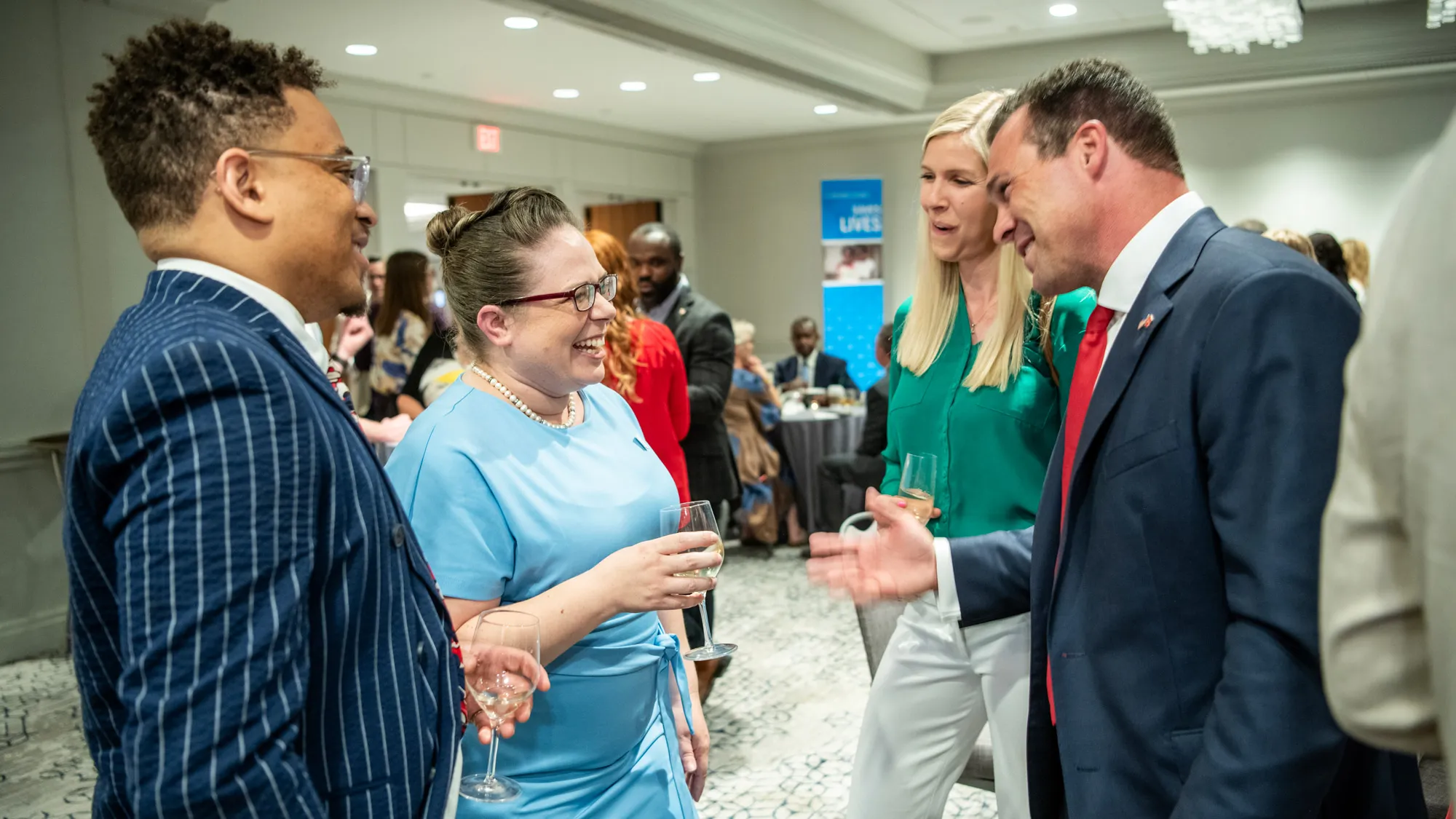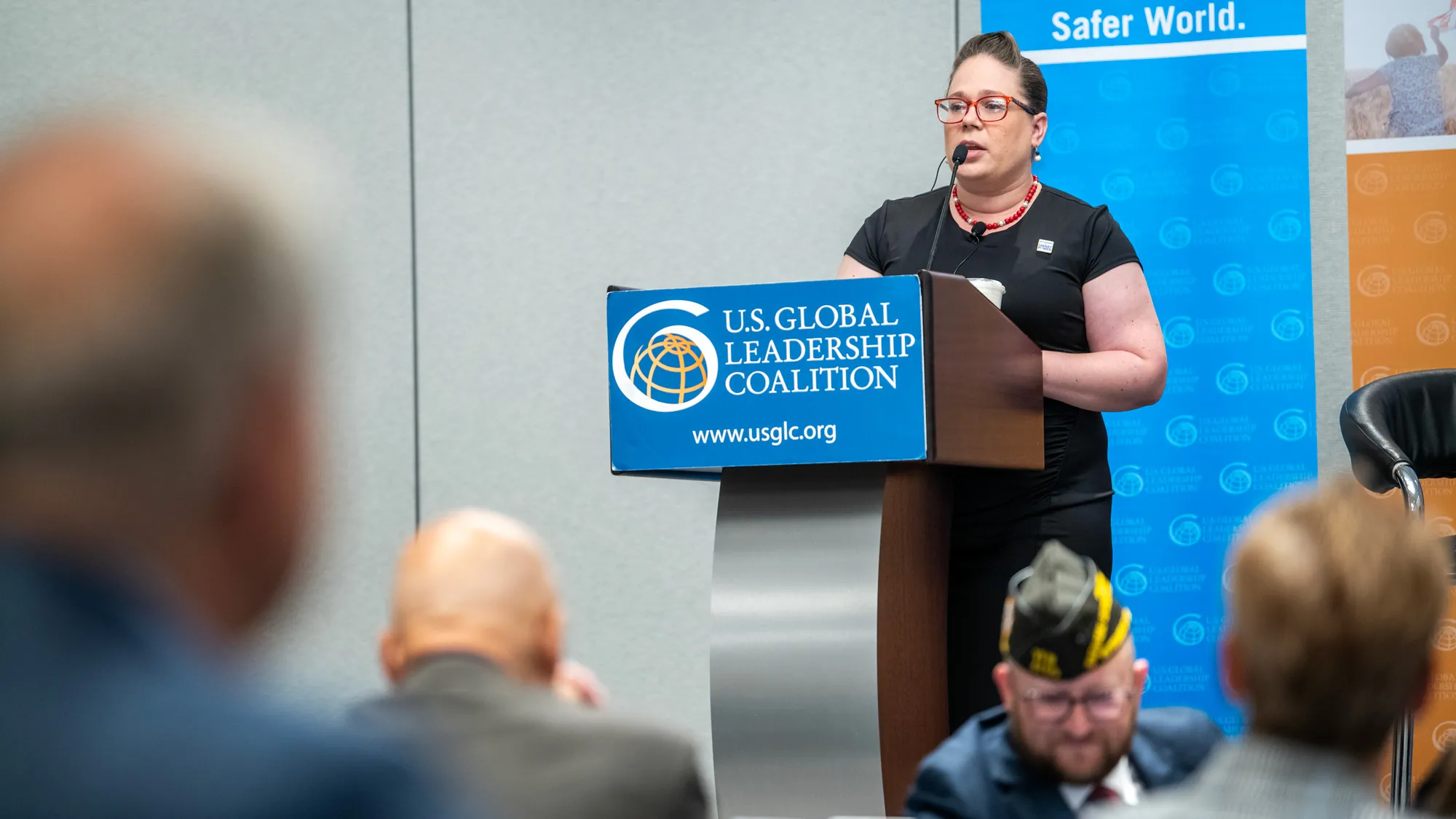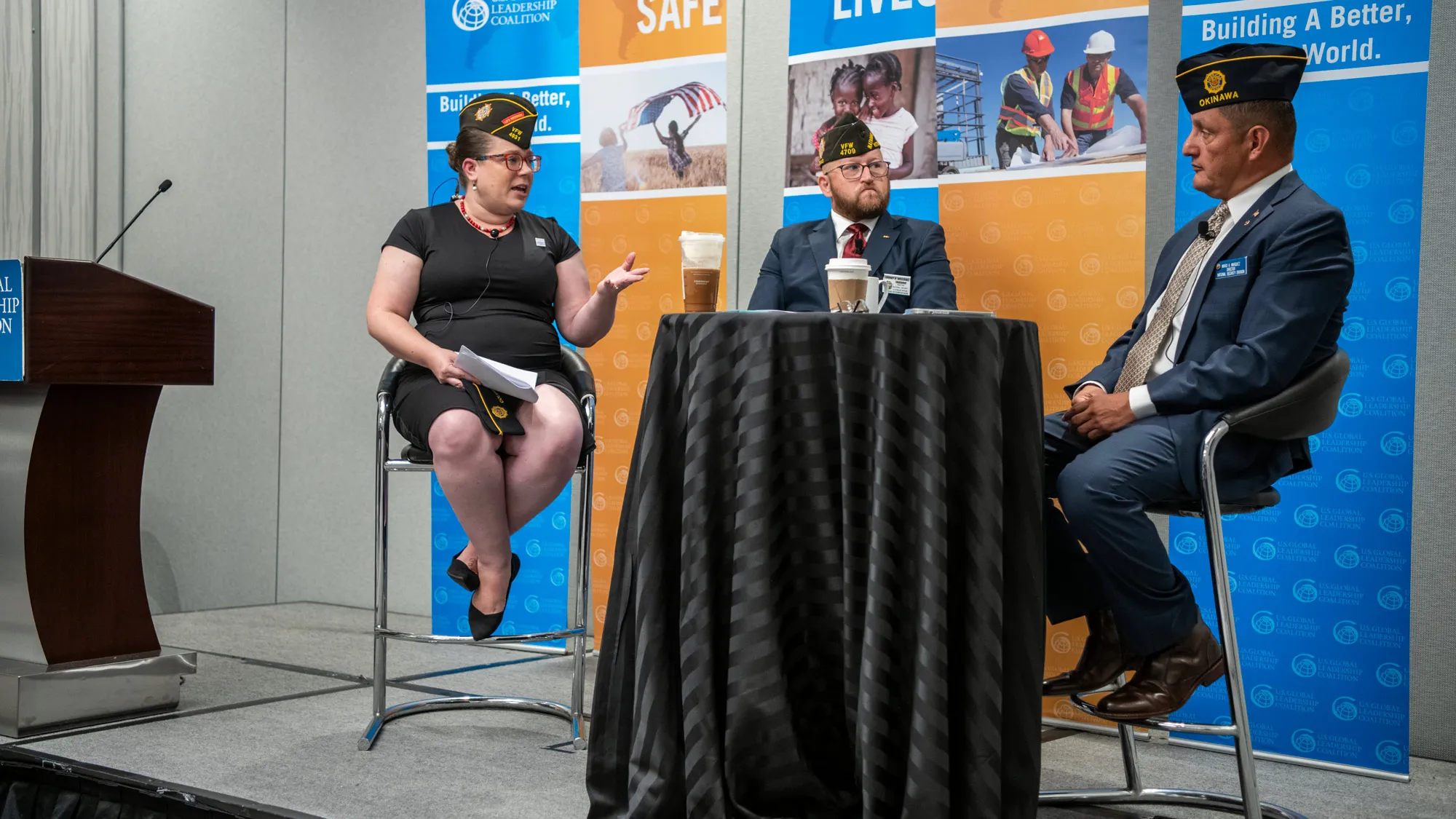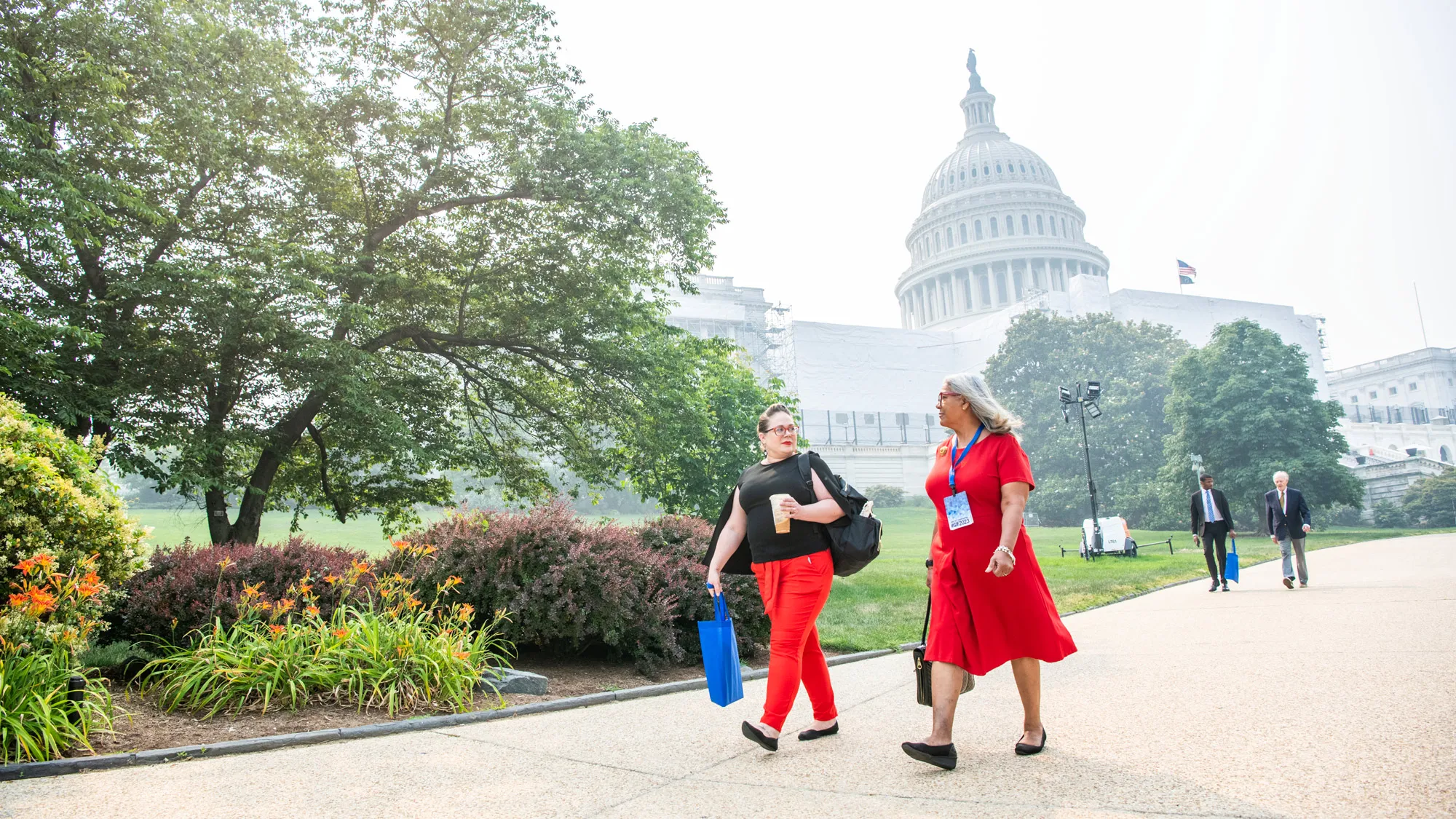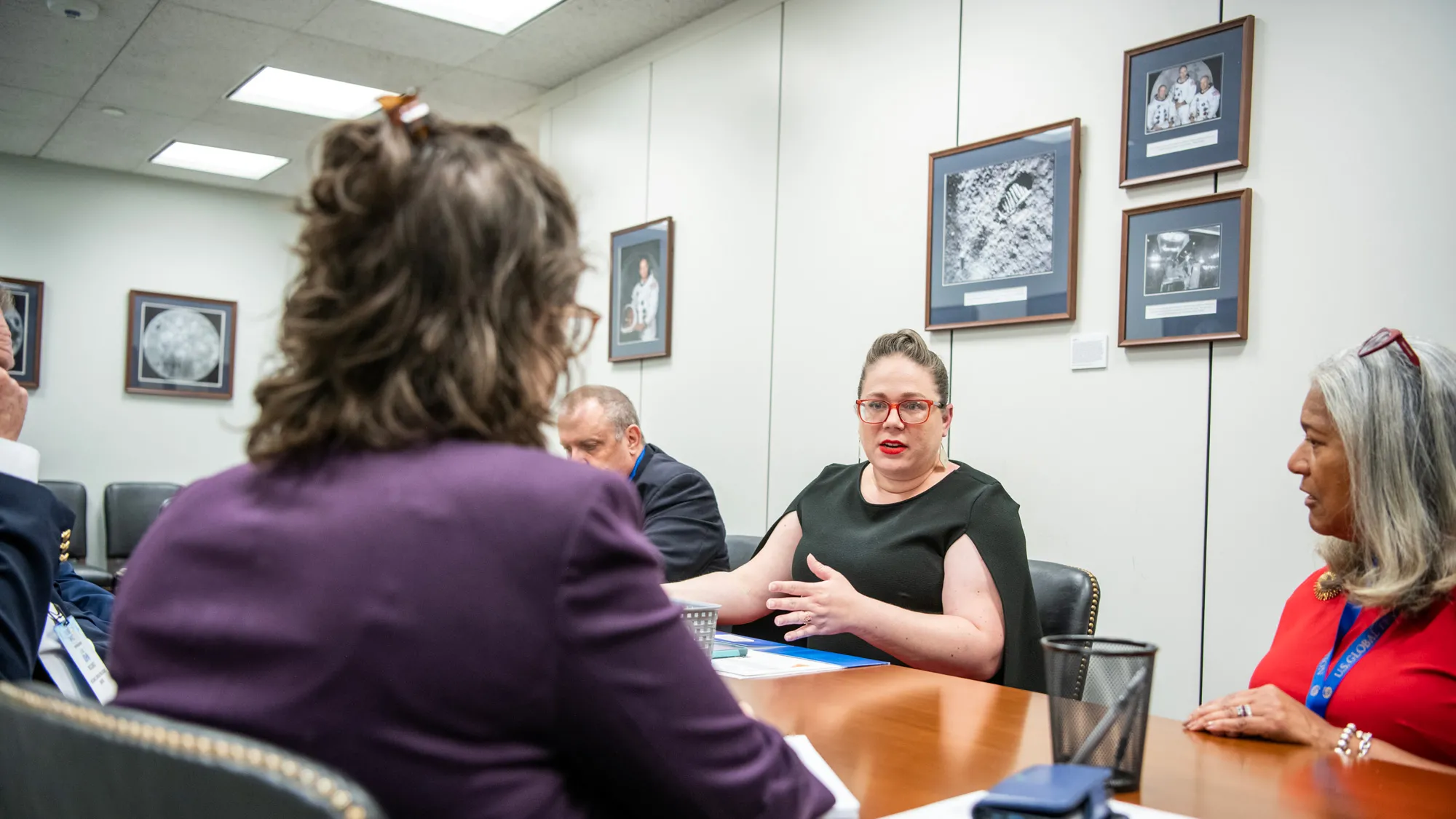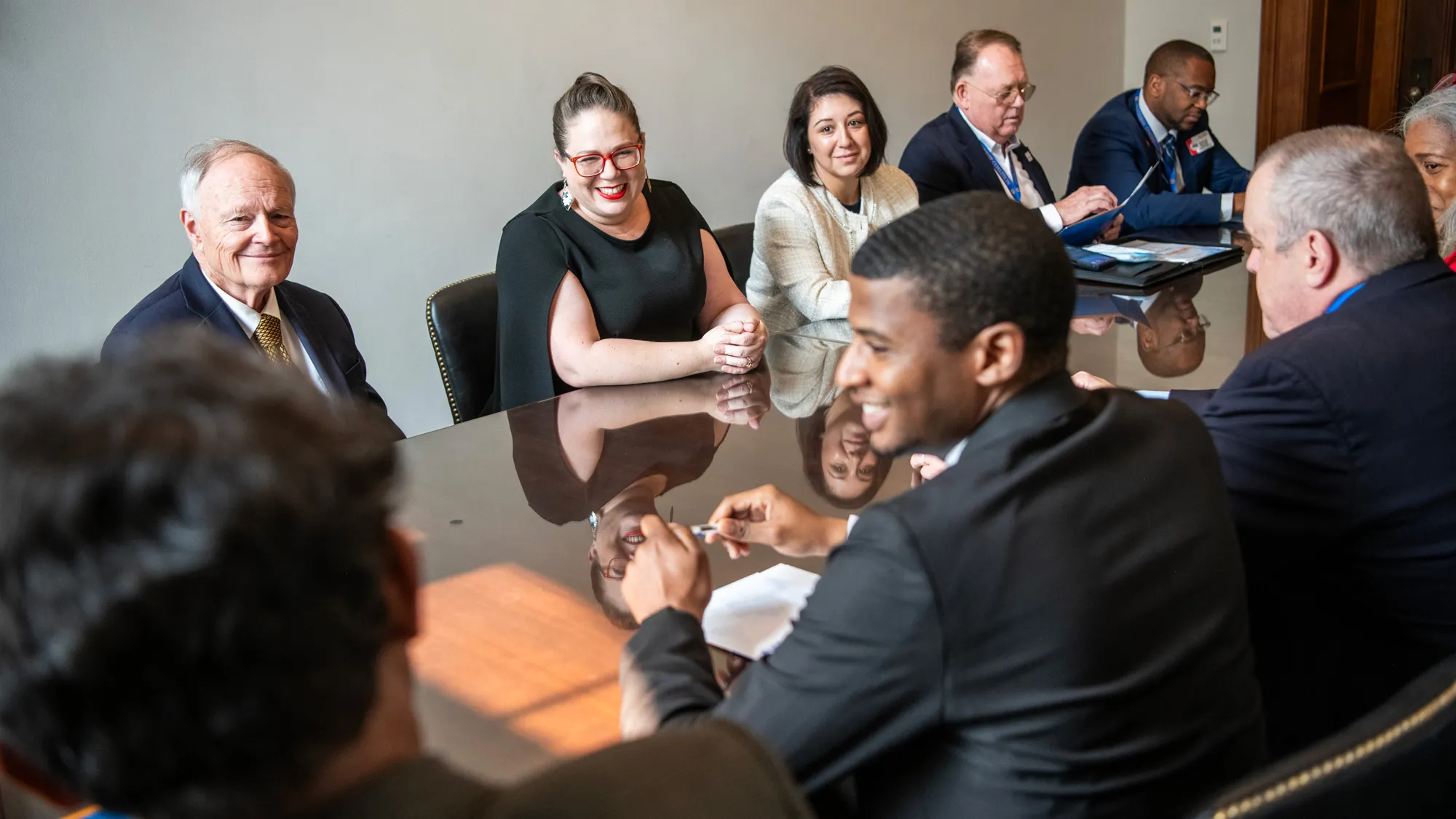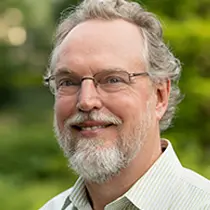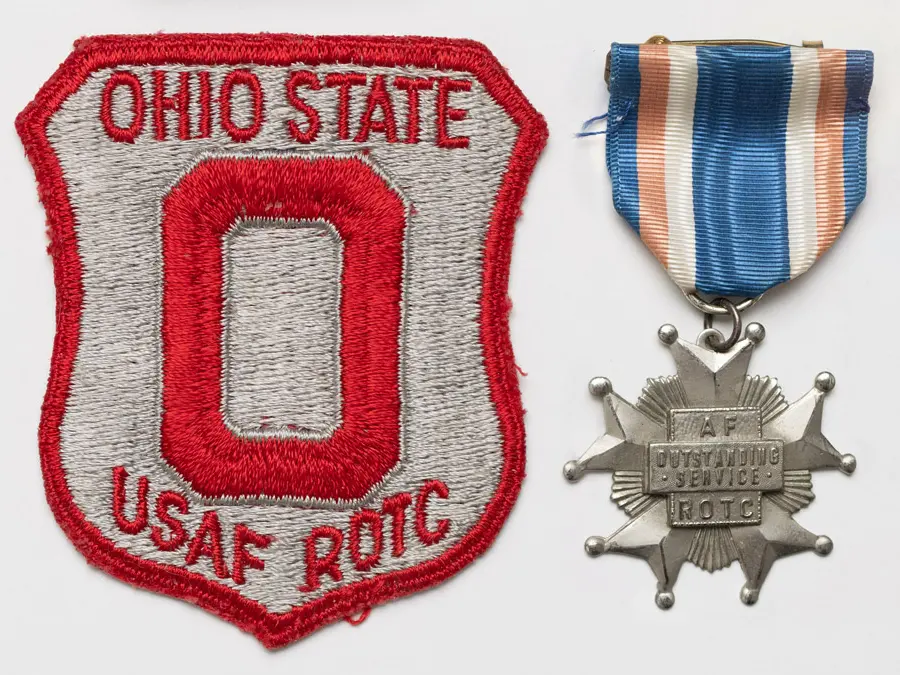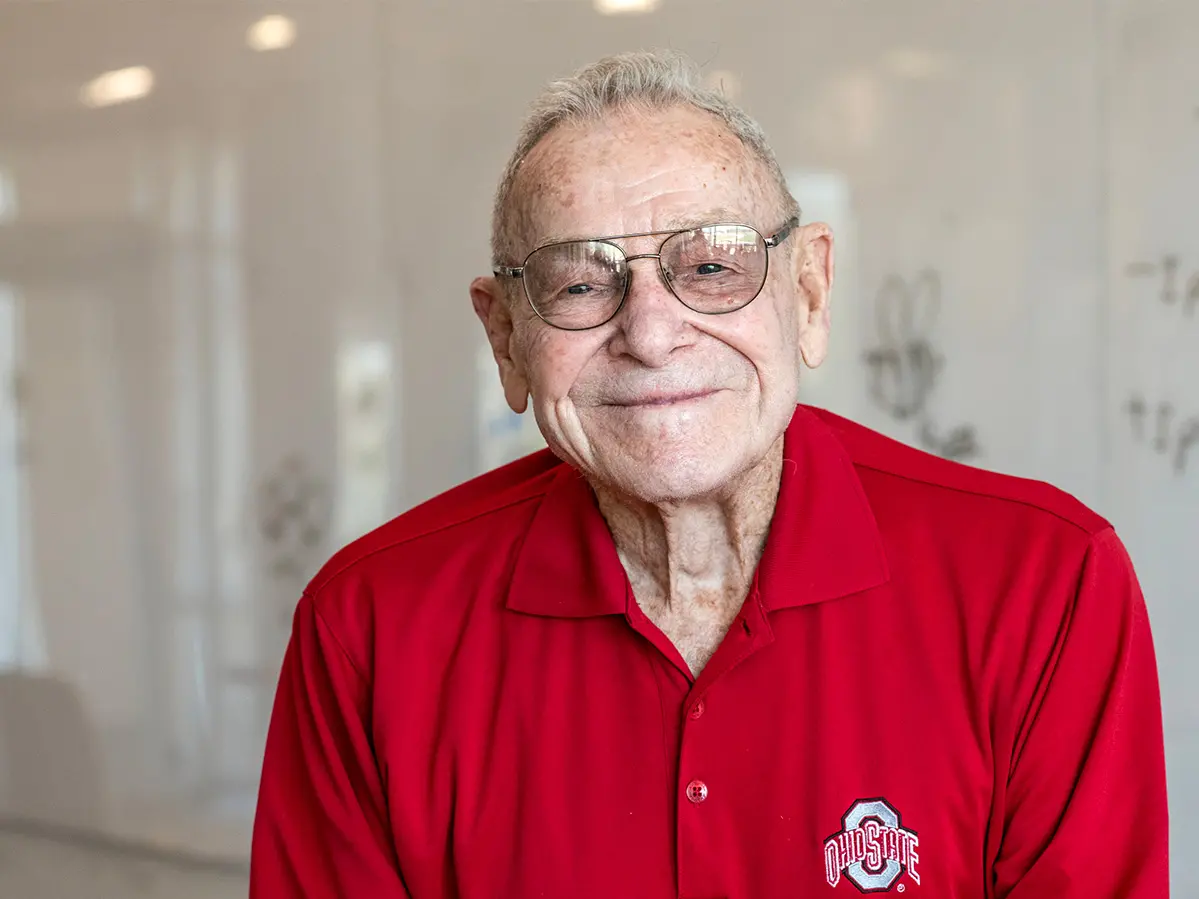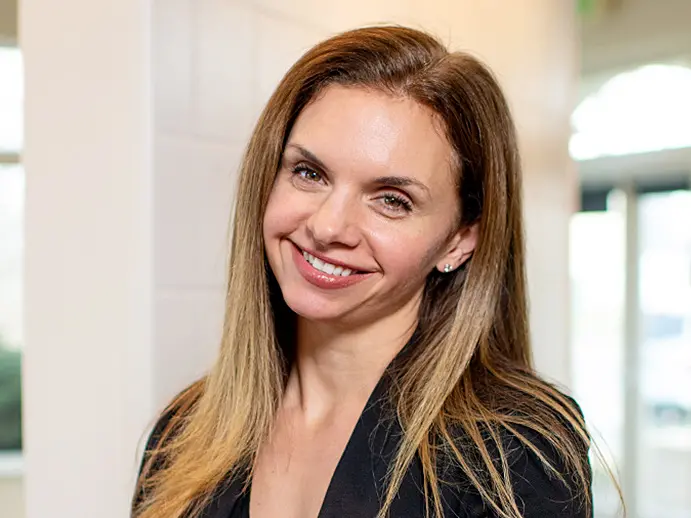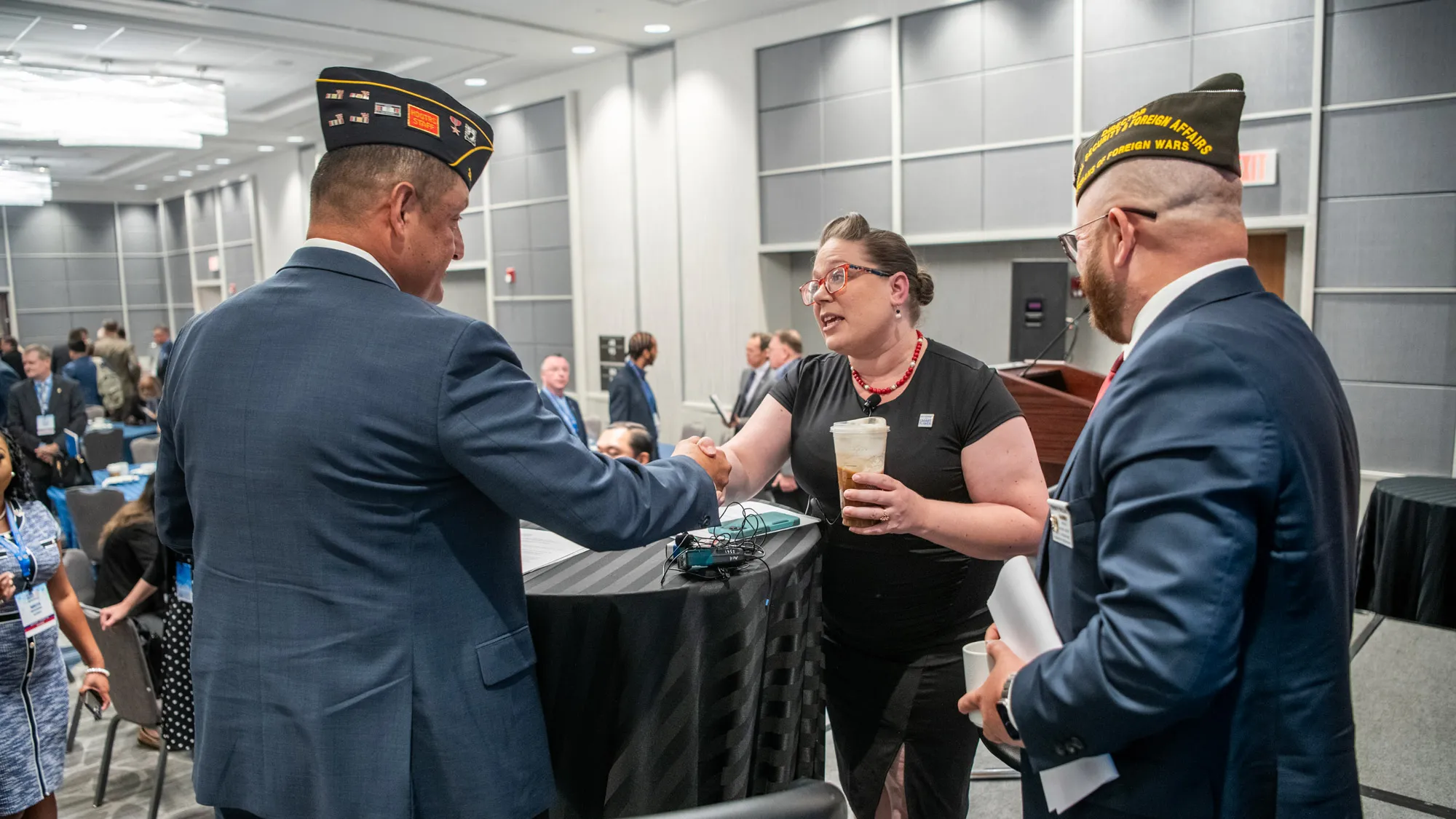
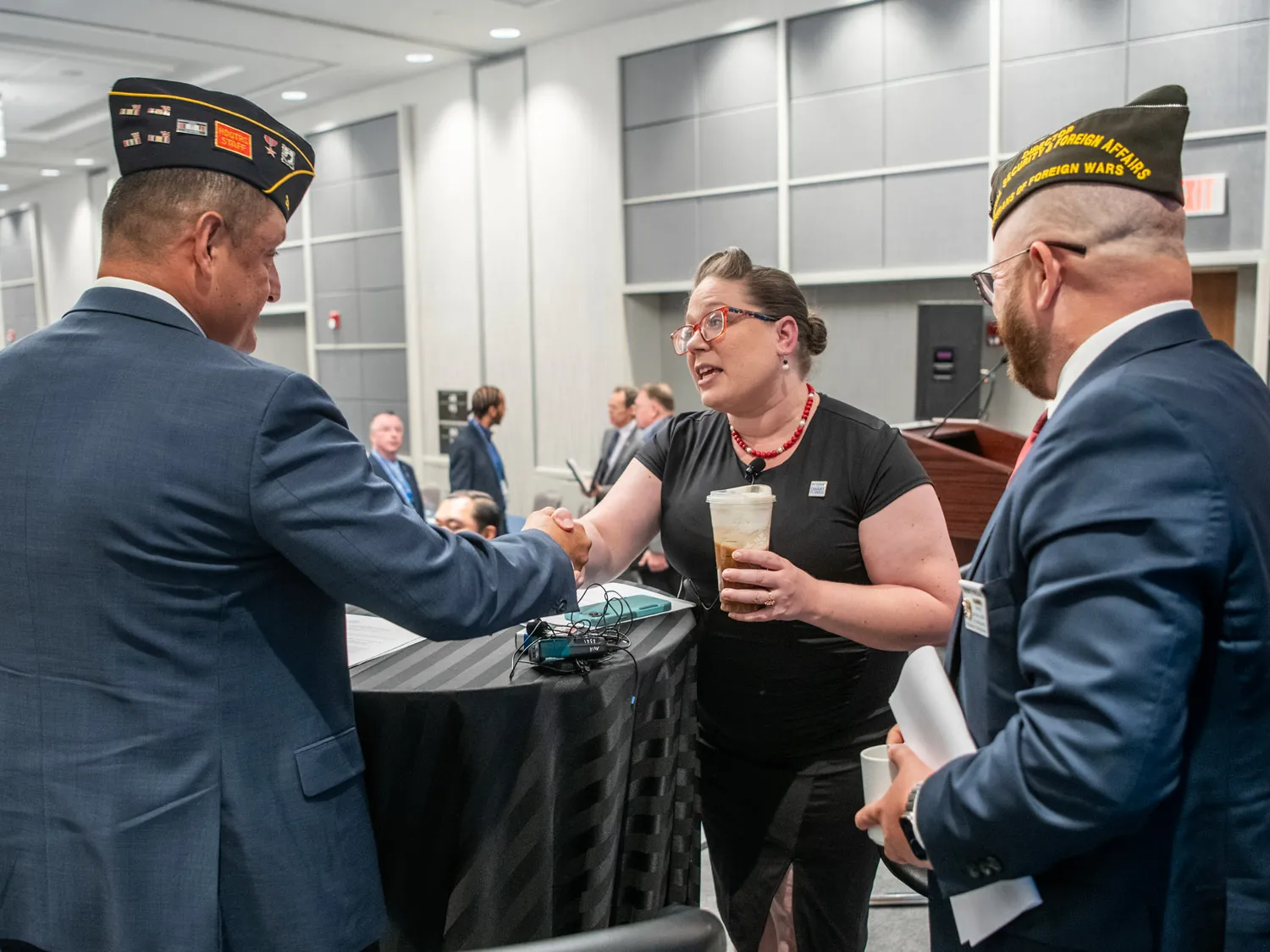
Gretchen Klingler uses her pure energy for good
On a single day, the 2019 graduate may be leading a local VFW post and meetings on Capitol Hill. A war veteran working to make war rare, she is driven by a need to care for her extended military family — and she finds a multitude of ways to do that.
A day earlier, Klingler had been on Capitol Hill leading Ohio veterans and businesspeople in meetings with staff of Senate and House members from both sides of the aisle. Her group of eight, representing USGLC, was advocating for a strong international affairs budget to remain foundational to U.S. foreign policy.
Klingler, 36, moved seamlessly from sitting under a crystal and glass chandelier in the granite Russell Senate Office Building to, hours later, sitting under a bronze chandelier hung in a cinder-block VFW post. Her enthusiasm saturated both scenes.
“I can’t keep up with you,” Walker tells Klingler. “Last time we talked, you had driven in 400 miles and had no sleep.”
“Oh, that time I was driving back from Milwaukee,” she replies.
Walker asks Klingler about her work for the USGLC, where she leads the Veterans for Smart Power initiative, covering 32 states.
Smart power, Klingler explains, combines development and diplomacy (aka soft power) and military force (hard power), each used in their own fitting ways, to best serve our nation in its dealings around the world. The idea is that frontline work funded by the foreign aid budget — and performed by American embassies, programs, civilians and veterans — can help avert war.
“Some international crises can’t be solved this way, but if they can, it puts less of my friends — our sons and daughters, parents and siblings — into harm’s way, and only as a last resort,” says Klingler, who was deployed to Afghanistan, Iraq and Djibouti during her time in the Air Force.
Walker nods. He knows danger. He served in the infantry in Vietnam from 1965 to ’67.
Klingler is sitting, face-level with him, listening with full attention. Her phone is in the back pocket of her jeans.
“The pace at which communication is changing right now is amazing,” Klingler says later. “But I think what largely hasn’t changed is this: the power of one-on-one, sitting down, having a discussion.
“There are a lot of different ways to get to yes, is what I’ve found. You just have to find the right path to it. You find something in common and work toward a better understanding of each other for whatever is the end goal.”
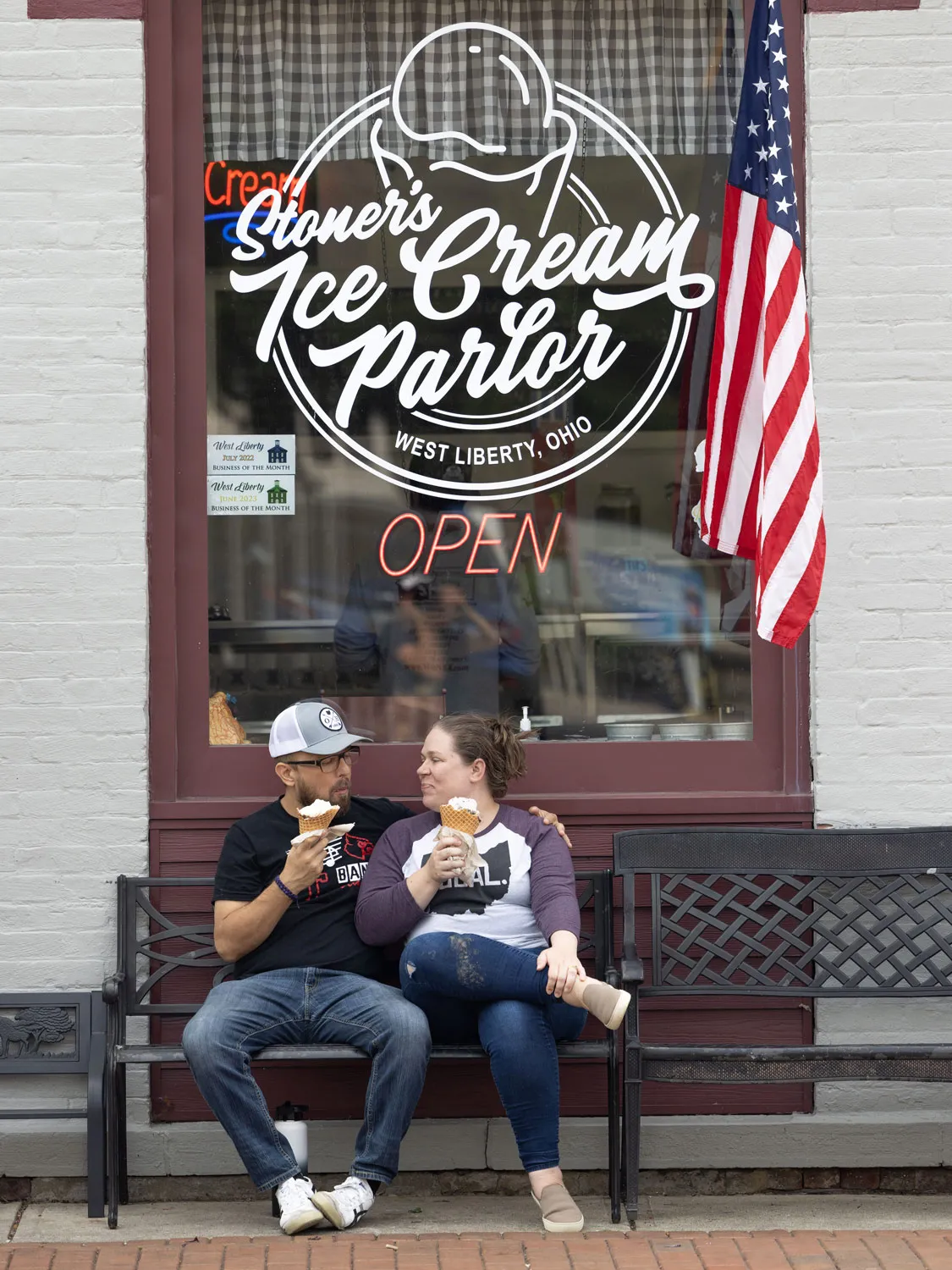
Klingler and her husband, Aaron Gall, visit West Liberty, in the Ohio county they have both called home. (Photo by Jodi Miller)
“Why do people become refugees?”
Klingler has written those words in Arabic on a whiteboard in an eighth-grade classroom at West Liberty-Salem Middle School. She had graduated from the district’s high school in rural Champaign County, Ohio, 18 years earlier.
The 25 students, reading an assigned novel called “Refugee,” spend the next hour respectfully listening to, and occasionally engaging with, their former neighbor as Klingler shares her personal experiences with refugees and immigrants.
She gives this slideshow presentation in four consecutive classes on this May morning despite an offer from the principal to do just one speech for a general assembly in the gym.
“Doing it this way is more organic,” Klingler says. “I wanted real conversations because this is such a big, important topic. In the classroom, I can bring it more to life with that connection of, ‘Hey, I’m from West Liberty, too. Let me tell you about some of the people I know.’”
She also knows some of these students’ families, and the teacher is a longtime friend and former classmate. This reflects the tightness of the local community, where the nearby three-stoplight village and surrounding farmland offer a foundation of commonality on which to construct relationships.
Klingler’s family moved here when she was 14, having sold a dairy farm in Ohio’s Medina County, where she was born and raised. By high school, she had long been fascinated by words and other worlds, all beckoning from beyond the rolling fields.
“I’ve just always been painfully curious about getting to know other people and finding ways to communicate and connect,” says Klingler, who has studied Spanish, French, Japanese, Arabic and American Sign Language, and dabbled in Icelandic and Romanian. “I follow my curiosity.”
Veterans Day walking tour
On Sunday, November 12, 2023, the Student-Alumni Council is honoring veterans with a walking tour of North Campus, whose buildings are named for Buckeyes who served. The hour-long tour sets off from the North Campus Clock Tower at 11 a.m. and concludes with refreshments in Remembrance Park. Direct questions and requests to osusacer@gmail.com.
She says curiosity, along with “part rebellion and part independence,” led her to join the Air Force, where she became fluent in the Iraqi dialect of Arabic while attending the Defense Language Institute in Monterey, California, for 63 weeks. Many of her instructors were immigrants and refugees, and their stories of joy, sorrow and resilience heightened her desire for knowledge about other cultures.
Opportunities to learn sprang from deployments. Klingler sometimes acted as a language and culture interpreter for military comrades and Iraqi and Afghan citizens. In her primary role, she spent 300 flight hours aboard a variety of aircraft to provide ground forces with intelligence, surveillance and reconnaissance during missions.
There was peril in Klingler’s role as a tactical systems operator on special operations. “Right before I joined my unit,” she says, “one of our planes went down in Djibouti, killing Senior Airman Julian Scholten, who did my job, and three more crew members. I never knew him, but that hit me and my community hard. It was sobering.”
Although proud and fond of her military service, Klingler recalls counting down the days — especially when her base was hit by enemy mortar fire — leading up to her enrollment at Ohio State. It was the second part of a 10-year plan she set for herself upon entering the Air Force. “It was my motivation to continue pressing forward,” she says.
Arriving on the Columbus campus as a 28-year-old freshman, Klingler found an abundance of support.
“Ohio State was fertile ground that gave me the opportunities to thrive — it was the nutrients in the soil that I needed to grow,” she says.
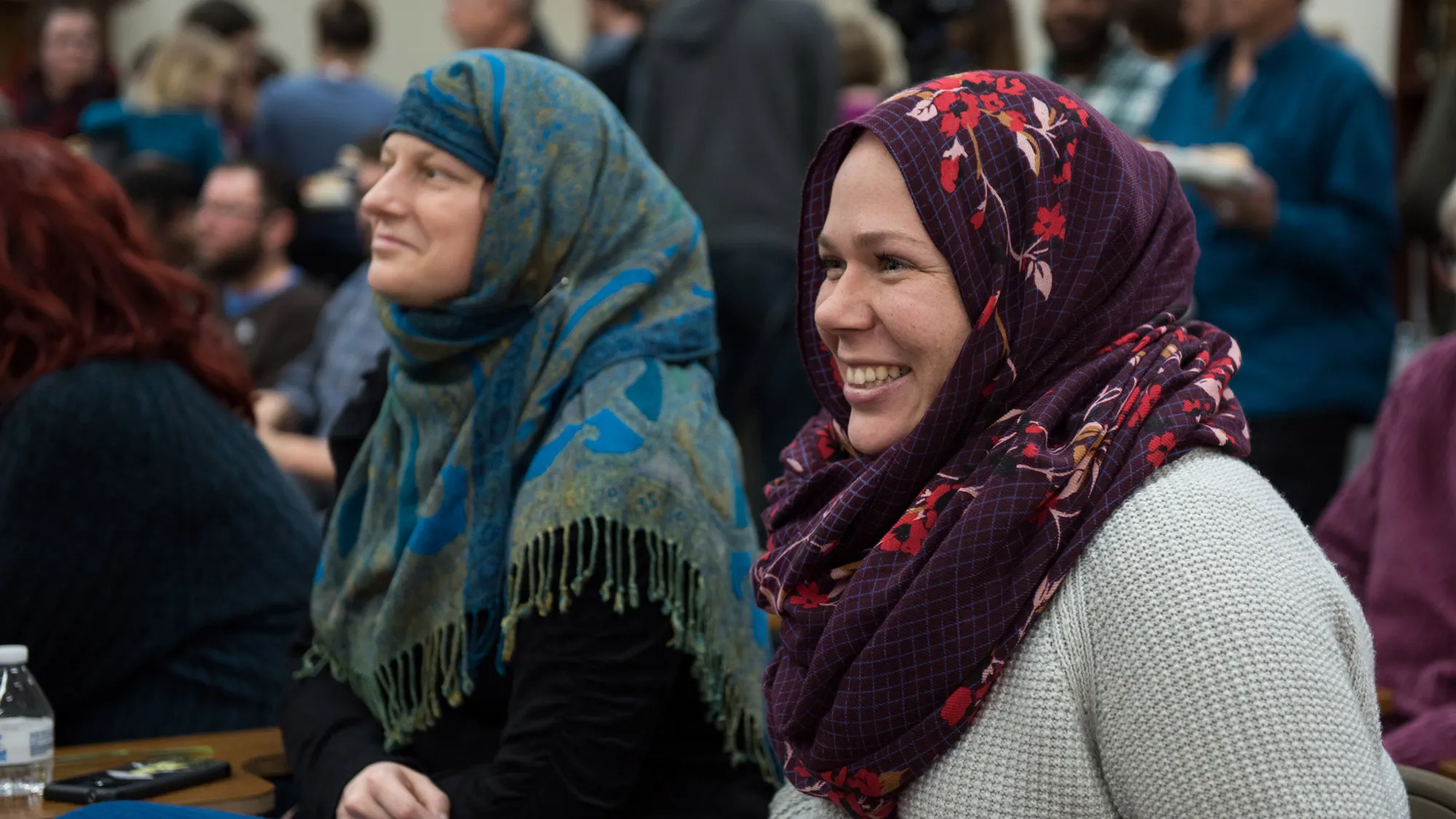
In 2016, then-students Kayla Dixon and Klingler joined a “get to know your neighbor” event at Masjid Omar Ibn El-Khattab mosque in Columbus. (Photo by Jo McCulty ’84, ’94 MA)
And grow she did. In 2017, Ohio State honored her as Veteran and Military Student of the Year. She also became the university’s first undergraduate to be named a Pat Tillman Foundation Scholar, putting her among a highly select group nationwide. While earning a pair of bachelor’s degrees in cultural anthropology and Arabic language (with minors in international studies and women’s, gender and sexuality studies), she was honored as the university’s undergraduate anthropology student of the year.
“In the classroom, Gretchen would sit right in front and she made sure that if somebody needed to be heard, they’d be heard,” says Professor of Anthropology Jeffrey Cohen. “Others didn’t have to agree with her, but she always made sure they had a voice. She knew the importance of that, which I find very special about her, particularly at this moment.”
Klingler’s empathetic interest in others was the heartbeat of her Global Mobility Project research, developed with Cohen. She met Iraqi women to learn how they overcome challenges and animosity while adjusting to American culture. She presented her findings at two international conferences.
“Gretchen always put the work and the women first; it wasn’t about her, which isn’t an easy thing to teach people,” Cohen says. “She has an incredible future in front of her because she’s the leader so many of us need to see, which is someone who is authentic and brings a much more nuanced idea of leadership.”
Klingler’s personal approach also shaped an Ohio State organization, Vets 4 Vets. She bonded with student veterans, helped them network within the campus community and raised their awareness of service and employment opportunities. Membership tripled under her two terms as president of that Student Veterans of America chapter.
“One of her great strengths is she connects across the spectrum very well and very quickly,” says Michael Carrell, former director of military and veterans services at Ohio State. “It’s because she’s genuine, and people see that. You feel like, after a little while, she’s somebody you’ve known for a long time. People want to be around her and want to be involved with what she’s doing.”
Carrell worked closely with Klingler during their time at Ohio State, and he credits her long-term vision for the ongoing success of the university’s Student Veterans Association. “She has an impact that is outsized and beyond herself,” he says. “I call her a force-multiplier, to use a military term.”
Klingler also served as a Women’s Veterans Community Advocate, Carrell says, meeting individuals and small groups, earning the trust of female students and making them feel welcome after they’d transitioned from military service.
Hannah Rodas ’20 attests. “Gretchen is a catalytic advocate for people,” she says. “That’s what she was for me.”
One path to civilian success
The John Glenn College of Public Affairs offers the Military to Civilian Leadership Certificate to support the transition to civilian life and demonstrate the value of military experience to employers.
After serving in the Air Force, Rodas had tired of its male-dominated culture and didn’t want to be involved with military groups at Ohio State. Then she met Klingler, who listened, understood, offered options and contacted campus veterans on her behalf. Rodas joined Ohio State’s Peer 2 Peer Sponsor Program and provided information, encouragement and guidance to veterans enrolling at the university.
“She helped me break down some barriers,” Rodas says, “and I loved what I did at Ohio State. I had a wonderful time.
“Between the pandemic and social media, there’s a lot of disconnect in today’s society. There’s so much me-versus-you kind of talk, and that’s just not a thought that goes through Gretchen’s mind. She doesn’t hold judgment or bias against anyone.”
It’s the mindset Klingler took in volunteering to teach English and American citizenship to Iraqi and Syrian immigrants and refugee communities in Central Ohio while she was an Ohio State student.
And on that recent morning, her open-minded approach infused her return to her rural school district. She spoke in Arabic when a student asked her to do so, and she sounded like a neighbor in offering an invitation: “If you have questions along the way, please raise your hand. This is supposed to be informative, but I also don’t want to just be talking at you.”
A half-mile from the White House, the annual USGLC Global Impact Forum churns through a June day of speeches and meet-and-greets populated by enough power brokers to fill a Grand Hyatt Washington hotel ballroom with palpable gravitas.
The 500 attendees include Oksana Markarova, the Ukrainian ambassador to the U.S.; Nicholas Burns, U.S. ambassador to China; and Mark Esper, former U.S. secretary of defense.
Also here are 150 veterans, including Klingler, who is trying to make each of them — without regard for branch, rank, status or age — feel as personally welcomed and important as any members of the USGLC’s national councils, which consist of former Cabinet officials, members of Congress, nearly every living secretary of state and more than 250 retired three- and four-star generals and admirals.
Klingler made certain to cut through the conference masses to find Christopher Herring, a member of the Texas Advisory Committee for USGLC. She didn’t know the retired Air Force veteran, but she’d invited him by email to attend this event for the first time.
The USGLC ensured that Herring was supported during his travels to Washington, and he appreciated just as much the fact that Klingler made a point to find him, standing alone, at the conference and say hello. “She didn’t have to do that,” he says.
Herring spent 20 years in the Air Force, and because Klingler reached out, he’ll be going to Capitol Hill in the morning to share his military experiences with lawmakers to stress the importance of smart power in our foreign policy.
“This connects you back into something that is of service,” Herring says. “It makes you feel like you have a place at the table, a sense of purpose, a sense of belonging. This feels like a family, just like our time in service was a family.
“The connection is real, and the relationships are very authentic. I came here by myself and didn’t know anyone. Now, I feel like I know everyone. That’s what is very special about what we have here, and Gretchen does that. She was the magnet. I’m glad to be part of her team.”
Klingler is responsible for veterans’ outreach and event programming, in-person and virtual.
She spends days and nights on email, the phone and Zoom — and also travels two or three times a month — spreading the USGLC’s mission to individual veterans, American Legion and VFW posts and leaders, and universities’ offices of veterans services.
“I feel like the skills that I learned from earning my anthropology degree have given me an advantage when it comes to doing this kind of advocacy work,” Klingler says. Those lessons help her connect the USGLC’s mission to individual veterans’ lives and experiences. And her approach with that message feels personable — not a sales job — to many appreciative attendees at this D.C. conference.
“Gretchen listens, and that’s 99.9% of what veterans want — just somebody to listen to their stories,” says John McCance, a retired Air Force lieutenant colonel from Beavercreek, Ohio.
“She makes one feel that they’re part of the team,” says Steve Oluic, a retired Army officer from Cleveland. “Her personal touch transcends everything, especially in a digital age. You can’t do diplomacy or advocacy through Twitter. You’ve got to look someone in the eye. Have a conversation. Be respectful. That’s Gretchen.”
A day earlier, Klingler hosted a breakfast event in which she conducted a question-and-answer session with two vets to better explain smart power and illustrate how the individual stories of everyone in the audience of 100 can bring that message to life.
Klingler’s work with veterans is part of the broad strategy of the USGLC, which brings together more than 500 businesses and nonprofits to stress the importance of America’s international affairs budget to policymakers in the capital and throughout the nation.
The idea is to help lawmakers see how U.S. foreign policy is best served when military might is combined with development and diplomacy. Another important message: It makes good economic sense to fund the soft-power tools deployed by the State Department and groups such as the U.S. Agency for International Development and the Peace Corps.
This message transcends political divides and gains credence with legislators when delivered by veterans who have witnessed the benefits of humanitarian efforts in struggling nations. Klingler makes that clear to the veterans attending her breakfast Q&A program.
“She was just having a conversation with everybody, and at everybody’s level,” says Dennis Kooren, a former U.S Army reservist from North Dakota. “She brought all of us into a conversation. I’d follow her into combat.”
A delegation that includes Oluic and McCance follows Klingler the next day into the offices of Ohio’s two U.S. senators, Sherrod Brown and J.D. Vance, and Reps. Mike Turner, Joyce Beatty, Mike Carey and Shontel Brown. Politically, they’re an even mix of Republicans and Democrats.
“It’s empowering to be an advocate for what you care about, knowing who you’re talking to and how to talk to them,” Klingler says as her group departs the Russell Senate Office Building and crosses Constitution Avenue.
The gleaming U.S. Capitol lies ahead like a beacon. “I love this,” she says. “This is democracy in action.”
The next evening, steaks sizzle 425 miles away on a grill out back of VFW Post 4931.
Near the smoke stands Aaron Riley, a Marine veteran who began his freshman year at Ohio State in 2022. He didn’t know anyone in Columbus. Then he met Klingler.
“It’s like a little family here,” he says of the Hilliard post. “You can feel the vibe. Gretchen makes you feel like you are part of this family.”
Inside, as Boy Scouts collect dirty plates, Klingler sits down next to David Wyatt, an unfamiliar visitor. He mentions he’d like some dessert.
“Don’t get up,” she says. “You are the guest, and we’re supposed to be serving you. Hi, I’m Gretchen. What is your name?”
